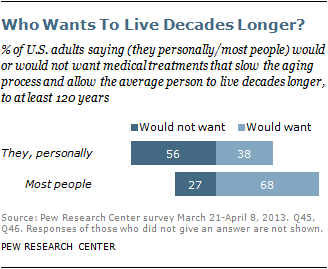Living ‘Forever Young’ in 2050

February 7, 2014
Alphaville’s 1984 single “Forever Young” is about enjoying one’s youth and how all of us should enjoy what we have right now, because you are only young once. New research and medical treatments about aging have come out and a study at Mayo Clinic Research in Minnesota found they would delay the onset of age-related illness in mice.
Surveys across the nation show how people view this new discovery: some want to live forever, others are going to be growing old the natural way. In the Pew article, Americans are also on the fence when it comes to slowing down the aging process.
In a survey, 56% of Americans personally said they would not agree with the aging treatment. Nevertheless, 68% of Americans said most of the nation’s citizens would want to slow down aging.
If a medical treatment does occur in 2050, I will be 60-years-old.
According to the U.S. Census Bureau, by 2050 one-in-five Americans will be 65 years or older and about 400,000 will be 100 years or older. The article goes on to say there are even more incredible changes on the way based on how humans age such as treatments to slow, stop, and reverse the process. One prediction that has circulated already states babies who have been born in the last year or two will live until they are 120.

Now before I drink the water from the fountain of youth, there are some facts about aging. First and most important fact is there is no scientific evidence toward stopping or reversing the aging process. This process of aging that happens over the course of our lives is called senescence. Our cells multiply constant throughout our life time. Senescence relates to bone and hair growth, although research about new cells being produced every x amount of years is not clear.
A scientist named Leonard Hayflick discovered this process by putting cells in a cold place such as a freezer and watched them slow down and stop dividing. Once he took the cells out of the freezer and placed them on a warm surface, the cells started to move and divide again. He learned that all of the cells stopped dividing after 50 divisions. Humans have ‘death’ programmed into them. This experiment is called the Hayflick Limit.
Life is a cycle. We are born, we live, and we die. It’s an unfortunate cycle but that’s life, no pun intended. In the YouTube channel SciShow, founder and star Hank Green, created a video titled “The End of Everything.” He says, “Like you and your guinea pig…all things will end and of course you know that. However, big things are going to end also, like the Earth and Sun.”
But of course the Earth and Sun will not go extincted anytime soon; that event will happen billions of years from now. However, this reference goes back to the life cycle: all living things die.
In the survey, citizens who voted against the medical treatment stated that it would be a bad thing rather than a good thing for society. Which is correct, more people equals more pollution, which decreases agriculture and distorts the ozone layer and the environment. While the people who agree with the medical treatment think that radically large life spans would strain the countries national resources.
But don’t develop Thanatophobia, the fear of death. All of us should not be thinking about how much we have left, but the people and things we do have now. Life is such a precious short virtue, in which some people might take for granted way too often. Maybe studies should be done on how our love ones make us feel young forever, rather than our age.

When U.S. adults were asked what the ideal length of life is two-thirds said 79-100 would be a good number to end their lives.
While most Americans are not personally in favor of living a longer life, but in terms of the economy, individual statuses, and what the medical treatment is made of: most Americans might have vital inquiries and become skeptical about treatments starting in 2050. A poll on Pew Research shows 66% of people believe that only wealthy people will be able to afford treatments. Another 66% said scientists will offer treatments before understanding effects. About 53% of adults believe the economy will not be back on track in 2050. The up-side in this chart state 79% think everyone should be able to receive treatment.
Nevertheless, this treatment might not actually happen. Adults (73%) are saying the likelihood of living to be 120 in year 2050 is rare and it will not happen. Only 25% say it will happen.
Whether you are for or against medial treatment toward slowing, stopping, or reversing senescence, one way or another all good people and things must come to an end. The way one wishes to live a longer live is based on what you do with your body while alive.





